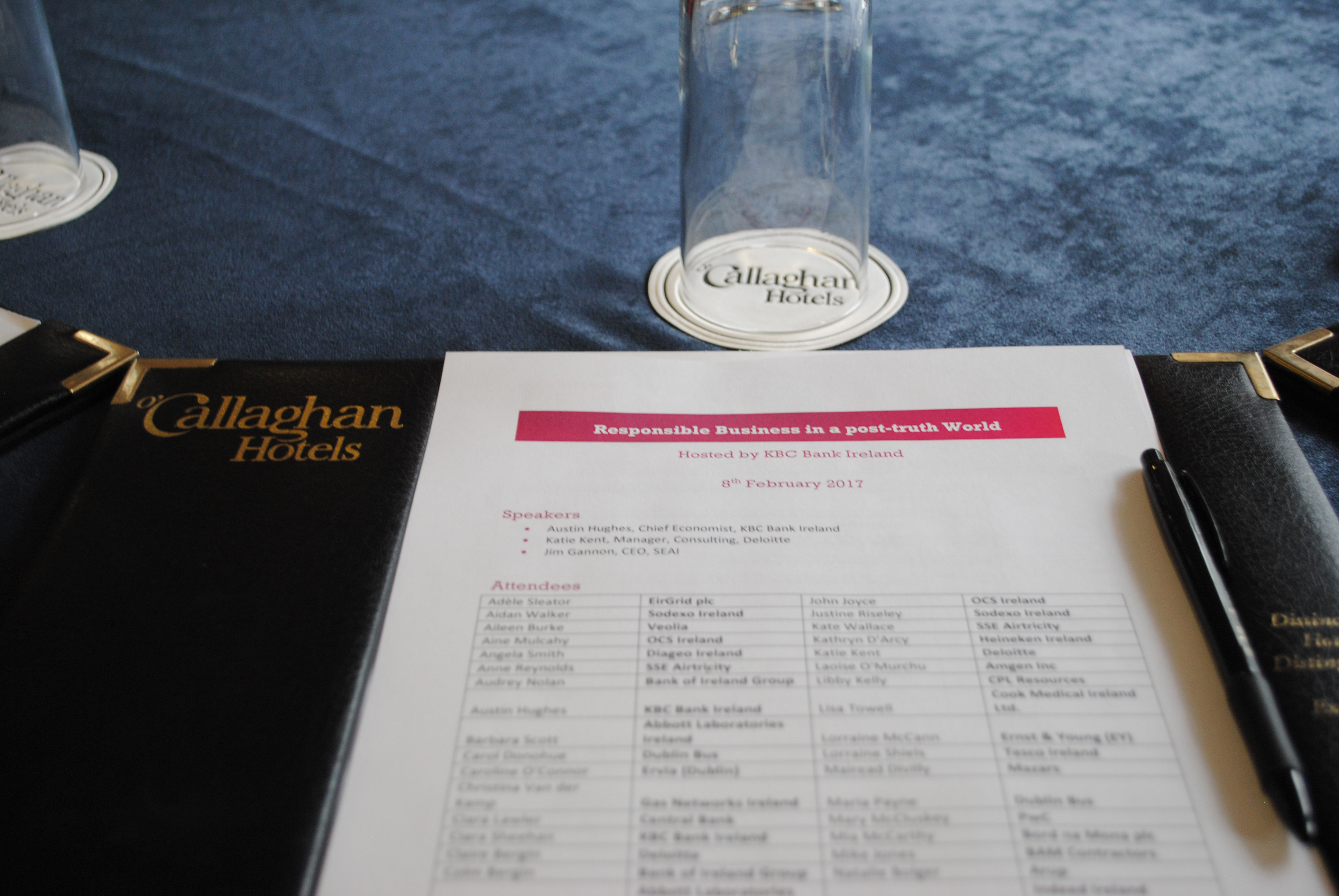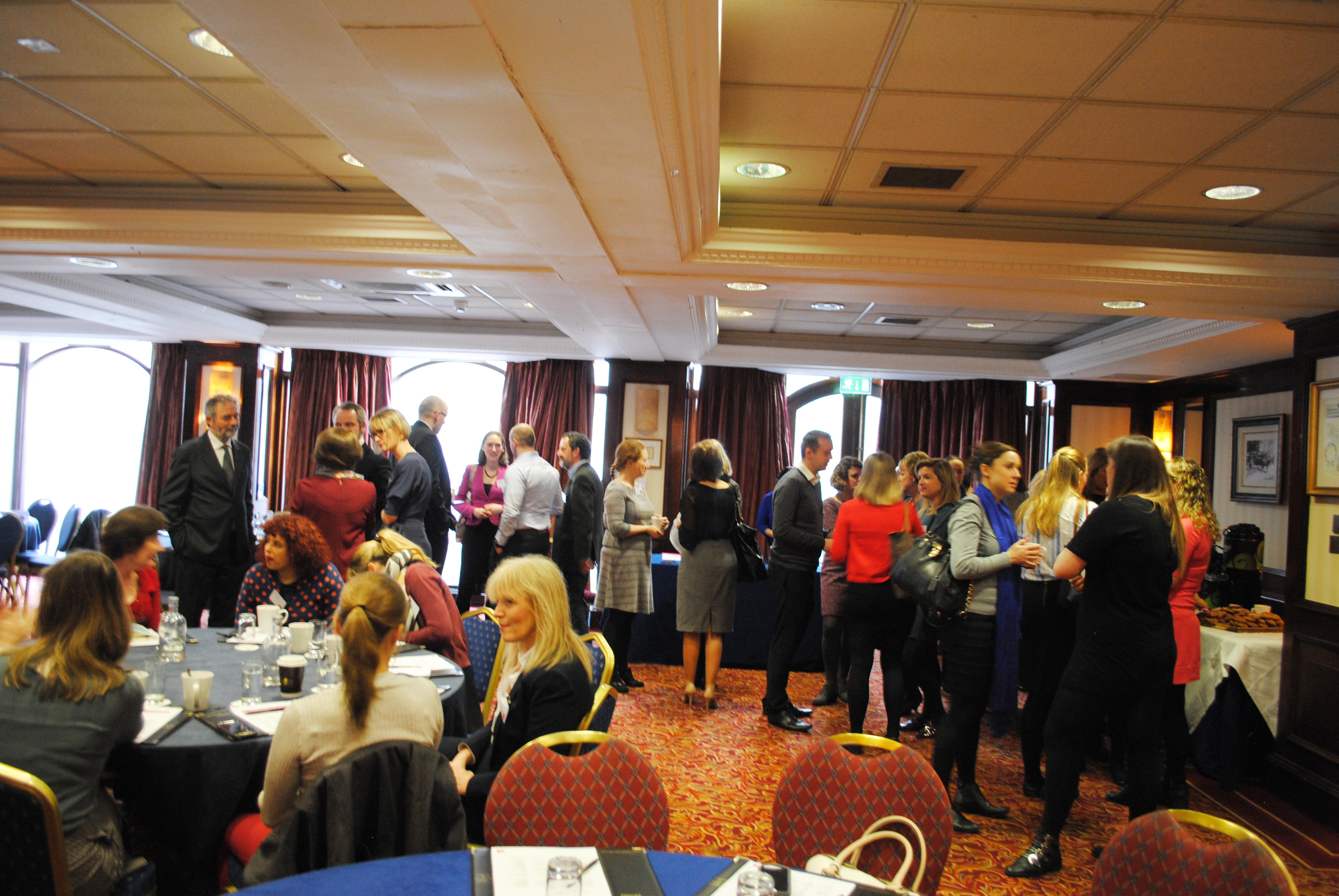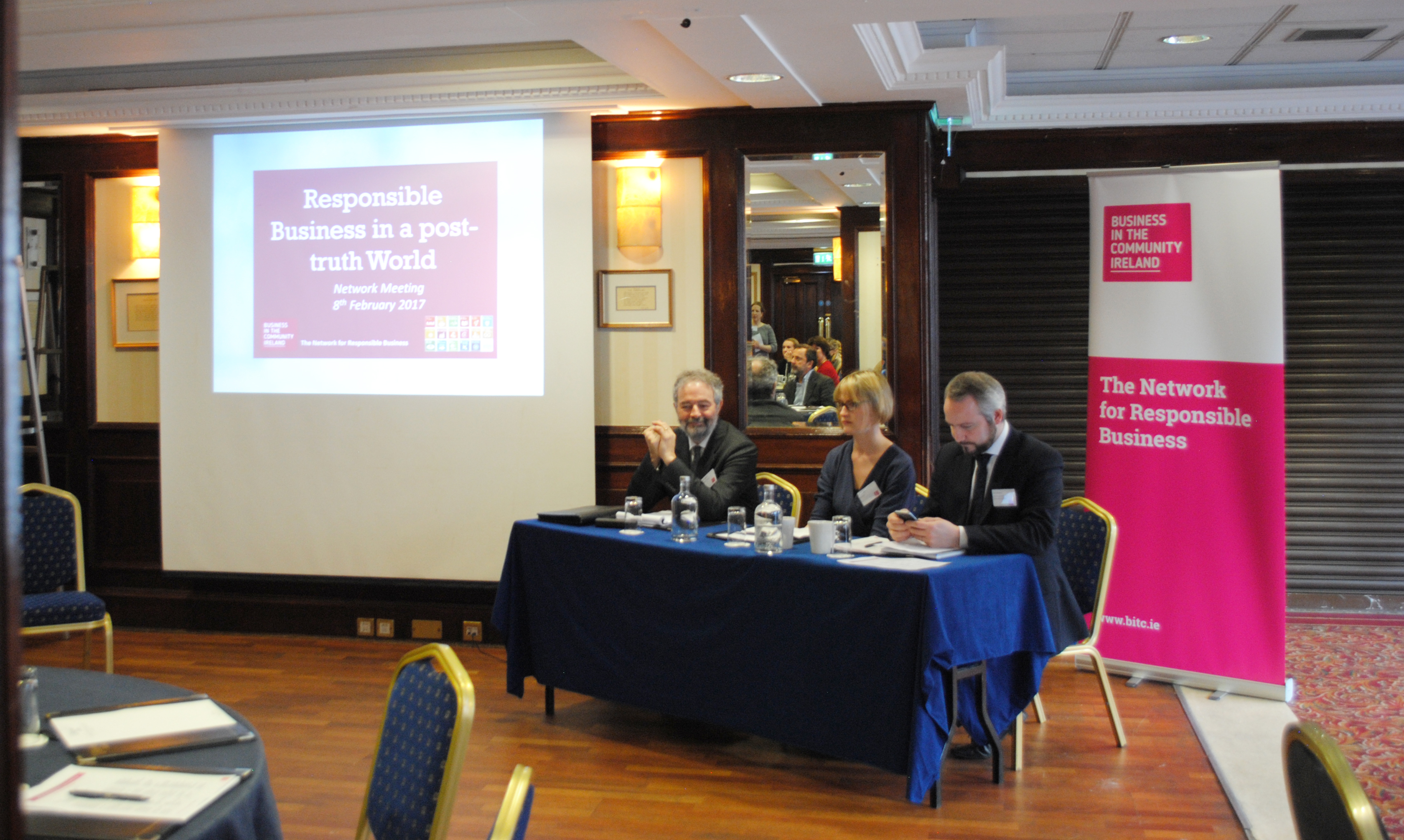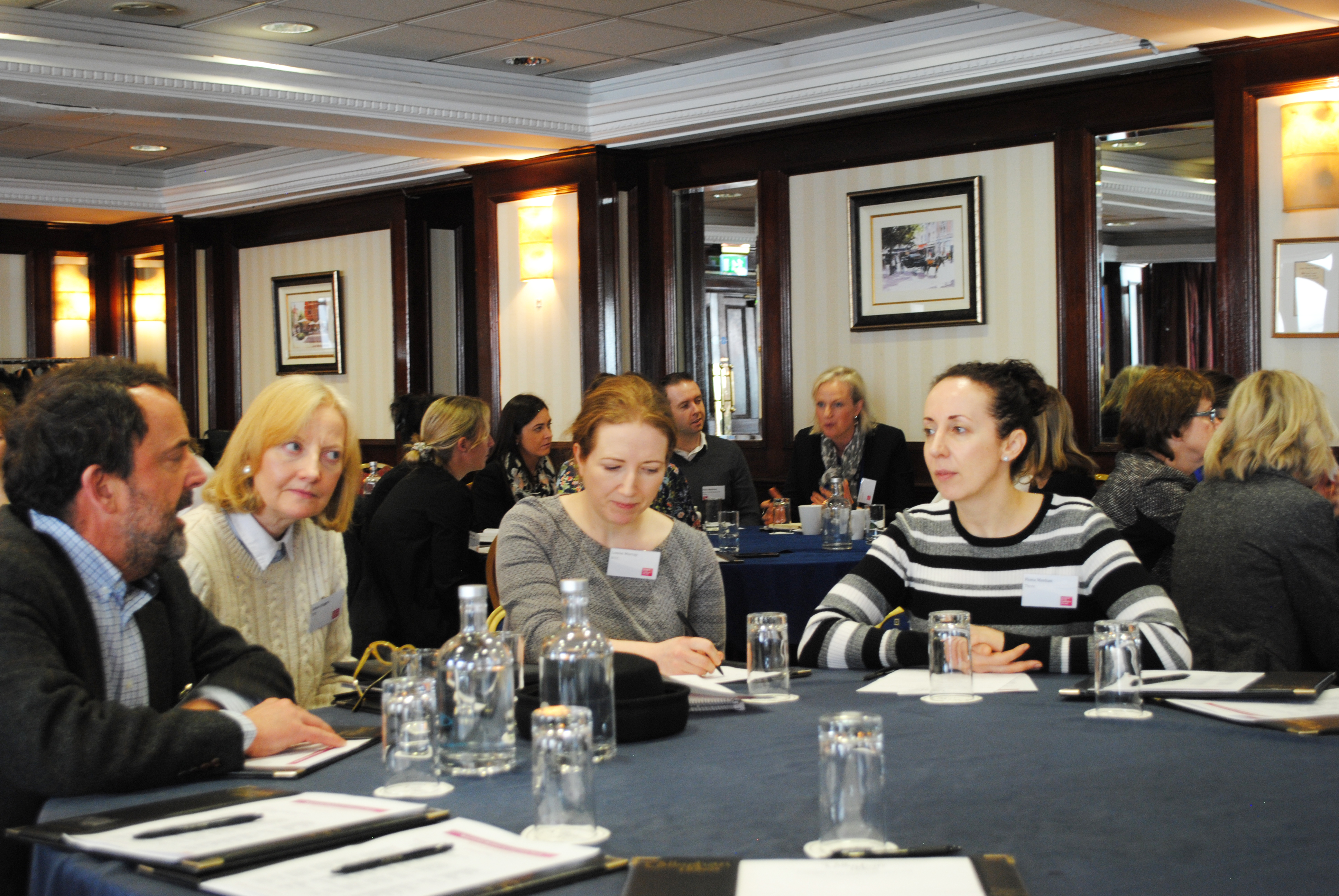Responsible Business in a post-truth World
Thursday, February 23rd, 2017

The Q1 Member Network Meetings on February 8th 2017 were hosted by KBC Bank Ireland. The meetings focused on Responsible Business in a post-truth World.
The context for the first network meeting of 2017 was set by Professor Jeffrey Sachs’s keynote speech on Sustainable Development at Business in the Community’s CEO Forum, October 2016:
“So the world agreed on sustainable development and the Paris Climate Agreement as part of that concept, both out of hope and out of fear. It’s wonderful to see this nation’s business leadership together celebrating responsibility because basically what CSR should mean, and what it does mean, is choosing hope and moving in a direction of decency and solving national problems and helping to solve international problems.
Nothing more and nothing less than that, that as business leaders, meaning that you’re at the core of this country’s economy and you are leaders internationally because all of those companies named [businesses achieving the Business Working Responsibly Mark] are international companies with important and wonderful international reputations as well, that you have a particular responsibility to help move in the direction of hope and to give reason that we can put the fears aside.
I really like the concept that was agreed by the world last year the way, this concept of sustainable development. What does it mean? The way that the 193 nations defined it is quite straightforward , it is that the world has a triple bottom line, a triple bottom line that is familiar to all of us, that we aim for economic prosperity but we do so in a way that is socially inclusive and environmentally sustainable. So economic, social and environmental objectives to be taken in a holistic way”.
You can watch his full inspirational speech here:
What does it mean for us to take economic, social and environmental factors into account? Our panel of speakers set the scene:
- Austin Hughes, Chief Economist, KBC Bank Ireland
- Katie Kent, Manager, Consulting, Deloitte
- Jim Gannon, CEO, SEAI
Economic
- It is not possible to do well economically without a focus on the triple bottom line. However, the general operating environment (short-term focus for instance) for business is pushing companies in the opposite direction and addressing this will need more work.
- People felt betrayed by the nature and extent of austerity. Other forces affecting them are deregulation and globalisation. Globalisation is believed by many to have been a positive force globally, bringing a large number of people into the middle classes and out of poverty. However there have clearly been globalisation losers and the pace of change is driving fear.
- Despite indices that show economic improvement, consumer sentiment index shows that only about a quarter feel better off. The rest feel either worse off, with 50% feeling no change. The rising tide is not raising all boats.
Social
- The Social Progress Imperative produces the Social Progress Index, an international index that measures outcomes rather than economic inputs across 133 countries. Instead of GDP as a measure of how an economy is performing, it looks at how people’s basic human needs are being met in a society, the foundations of their well-being and to what extent they feel they have opportunities.
- Ireland scores well overall (12th). However, when compared with 15 other countries that have similar GDP, where you would expect our outcomes should compare well, we are mediocre. There are areas of concern: water and sanitation, obesity and suicide rates, and waste water management and biodiversity.
- On the positive side, we are doing well in regard to tolerance and inclusion. We also do well on access to education, the number of people with degrees etc.
 Environment
Environment
- Growth in ethical investments: there is a particular type of investor interested in medium and long term rewards and they tend to stay with their investments rather than dip in and out. For business, the recommendation, therefore, is to cultivate your markets i.e. the people who are willing and able to pay premium prices for ethically sourced goods and services
- Amid rising geopolitical uncertainty, we are seeing the emergence of new leaders from other economies i.e. China at Marrakesh and then again at Davos, as US absence opened up space.
- Business has a voice: in the U.S. 200, leading companies in the US signed an open letter to President Trump that they would pursue climate action targets despite political/administrative backtracking in the US. Increasingly businesses are able to make a clear quantitative and qualitative link between CSR and business effectiveness. Can we reclaim the phrase ‘Captains of Industry’ – an old fashioned term that used to mean industry leaders who were interested in social, environmental and economic concerns as well as business success.
- Politicians by virtue of their position have to be cautious in their word choice and statements, However, the US election showed that the clear and easily understood message appeals to people. The simply story or narrative is powerful. Business has the advantage of being able to use simple and clear language, to have an easily understood and powerful message.
- How could business capitalise on this?
- Open letter to the Taoiseach about a call to action on social/climate/business issues that affect society
- Utilise markets and resources at disposal to influence and shape public voice; take a position.
Group discussion
Given the context outlined above, do our member companies believe that their CSR/Sustainability strategy is keeping pace with the challenges?
Is there more that they and the Business in the Community network can or should do?
Issue
- Some observations that people are hearing more climate deniers and questioning the need for strong environmental policies and practices.
- Concern that sustainability is still not integrated in some businesses and may, as in the last recession, be put on the back burner.
- Short termism is still an issue. Companies talk about long term sustainability but are still focused on quarterly results.
- To what extent do senior managers and middle managers understand the triple bottom line, what it means to take a holistic view of economic, social and environmental factors when doing their day job?
- Do recruitment policies and practices exacerbate inequality?
Actions
- Accountability: One company has now included environmental and sustainability KPIs and objectives in their bonus structure and this has helped push the agenda and make it more mainstream. Another idea is to nominate a senior level sponsor for each pillar in CSR, not just sustainability as a whole. Consider how to involve middle managers in CSR and sustainability so that is seen as part of the job and an important learning for future leaders
- Business case: Use the business case to keep initiatives going (see Business in the Community’s resource here). Align CSR and Sustainability initiatives with competitiveness, cost efficiencies, business goals, risk management and future-proofing your business. For example, one organisation takes a risk-based approach to their CSR strategy – looking to be proactive rather than reactive (this was a lesson learnt from past experiences). Conscious that a large percentage of staff will be retiring in a few years they are putting in place programmes to address this – for example looking at diversity.
- Build trust: When communicating about business initiatives, include the commercial and sustainability reasons for undertaking such an initiative. This will build trust and reputation with internal and external stakeholders.
- Materiality Assessment: Materiality assessment will highlight what your stakeholders feel is important; their voice can help put sustainability on the agenda for the executives and senior team.
- Communication: Make a concerted effort to get CSR and Sustainability messages through to employees and other stakeholders. Make CSR/Sustainability reports more relevant; include targets and objectives as well as reporting the performance.
- Social Impact: To support an inclusive society and sustained economic recovery, community initiatives need to be sustained over the long term and be effective in addressing the social issues that a community is experiencing. Companies also have a responsibility to build capacity in their sub-contractors and this also supports the local economy. The Social Progress Index (SPI) useful for aligning strategy with the Sustainable Development Goals, helping to decide what areas an organisation can focus on. Consider SPI when reviewing policies e.g. recruitment to see if policy or practices changes can have a great social impact.





